Intel SSD 520 Review: Cherryville Brings Reliability to SandForce
by Anand Lal Shimpi on February 6, 2012 11:00 AM ESTRandom Read/Write Speed
The four corners of SSD performance are as follows: random read, random write, sequential read and sequential write speed. Random accesses are generally small in size, while sequential accesses tend to be larger and thus we have the four Iometer tests we use in all of our reviews.
Our first test writes 4KB in a completely random pattern over an 8GB space of the drive to simulate the sort of random access that you'd see on an OS drive (even this is more stressful than a normal desktop user would see). I perform three concurrent IOs and run the test for 3 minutes. The results reported are in average MB/s over the entire time. We use both standard pseudo randomly generated data for each write as well as fully random data to show you both the maximum and minimum performance offered by SandForce based drives in these tests. The average performance of SF drives will likely be somewhere in between the two values for each drive you see in the graphs. For an understanding of why this matters, read our original SandForce article.
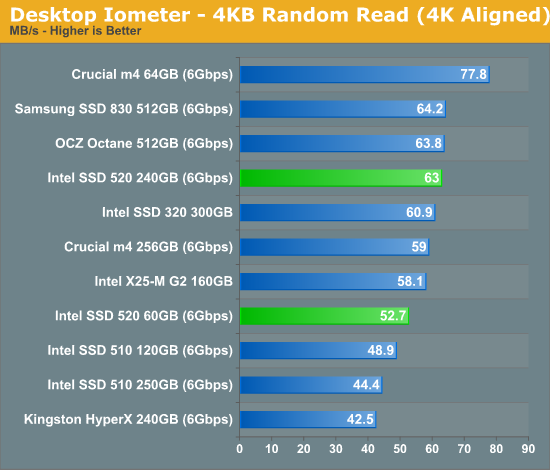
Random read performance seems to have topped out around 60MB/s for most drives and the 520 is no different here.
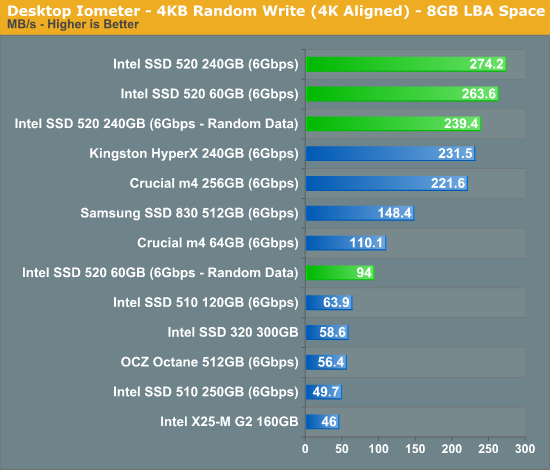
Random write performance, especially with highly compressible data sets the 520 performs beautifully - even outpacing the SF-2281 based Kingston HyperX.
Many of you have asked for random write performance at higher queue depths. What I have below is our 4KB random write test performed at a queue depth of 32 instead of 3. While the vast majority of desktop usage models experience queue depths of 0 - 5, higher depths are possible in heavy I/O (and multi-user) workloads:
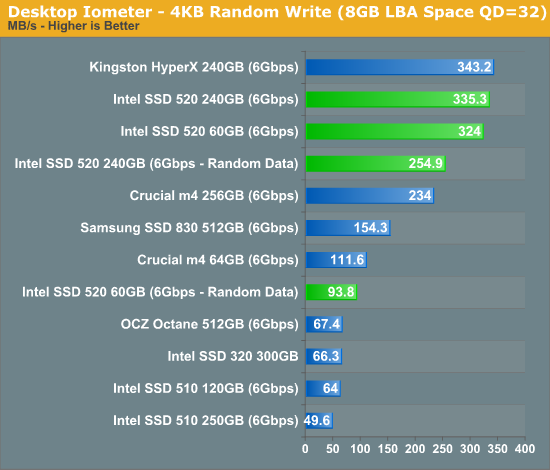
At higher queue depths the HyperX catches up to and surpassed the 520, perhaps indicating that Intel has done some work to optimize low queue depth performance on the 520 (likely what most end users will encounter).
Sequential Read/Write Speed
To measure sequential performance I ran a 1 minute long 128KB sequential test over the entire span of the drive at a queue depth of 1. The results reported are in average MB/s over the entire test length.
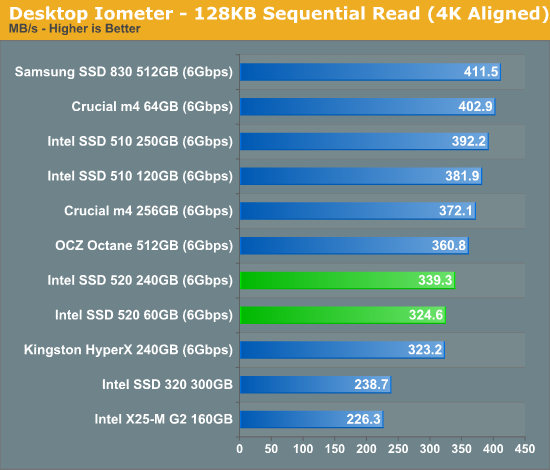
Sequential read performance is actually a bit lower than Intel's 510, but still higher than a standard SF-2281 drive.
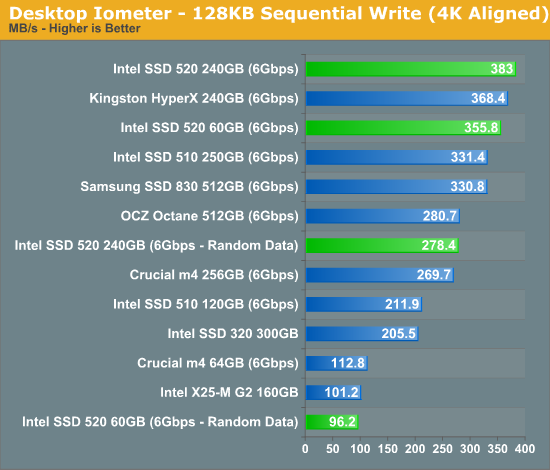
It's important to note just how close the 520's peak random write performance is to its sequential write performance. A big part of this is obviously that the SF-2281 is throwing away a lot of the data it has to write, but even if we compare incompressible 4KB random write to highly compressible 128KB sequential write we see a good ratio. The closer those two values are the more optimal the controller/firmware design is as, in theory, smaller random writes should be grouped to effectively become large sequential writes from the perspective of the NAND.










138 Comments
View All Comments
ckryan - Tuesday, February 7, 2012 - link
True, but the 520 series isn't the 320 series. Intel has the 510 and 520 series to satisfy the user that desires speed, but the fact is Intel will sell more SATA II than SATA III drives for the next few years.lyeoh - Tuesday, February 7, 2012 - link
Maybe making fast expensive drives and selling them for profit isn't Intel's main goal. Perhaps Intel is trying to push the SSD market to the next step.Nowadays drives are often the biggest performance bottleneck, and so it stops making a big difference whether you buy a top of the line Intel CPU or not, or even buy AMD instead.
But once fast SSDs start becoming more reliable and sell at closer to _commodity_ prices, then Intel can get back to selling powerful CPUs to more people.
A marketplace full of fast expensive SSDs that BSOD and lose data and slow cheap hard drives doesn't help for such a goal.
But helping Sandforce _eventually_ get their act together (Intel aren't doing this for free of course) might do so. They might also be concerned about Samsung.
NitroWare - Wednesday, February 8, 2012 - link
"Perhaps Intel is trying to push the SSD market to the next step."Intel has frequently done this with different technologies.So it is logical.
In the article, Intel claimed they had 100% of staff on Intel SSD. Vendors usually do not make claims about internal employee hardware.
Ethernet, Wifi, PCI, Legacy free, non x86 ISA (Xscale, Itanic), Fibre, PC I/O and RAM Technologies.
They even dabbled with video conferencing years ago
gramboh - Monday, February 6, 2012 - link
I'm in the market for a 240gb SSD in the next few months, and would love to buy a 520 series over other SF-2281/Marvell options, but right now it's a 42% price premium which is way too much.The 120gb has a more realistic price premium of about 25% (taking into account rebates on the 2281/Marvell drives) which I would consider, would have been nice for Intel to price the 240gb at $400-430.
mckirkus - Wednesday, February 29, 2012 - link
"Would have been nice for Intel to price the 240gb at $400-430"The 240gb version is $357 on Amazon right now (2/29).
LeftSide - Monday, February 6, 2012 - link
I bought the Kingston version on Black Friday for $120 after MIR. It was a great deal. Although I did worry about the BSOD (especially right after sending in the MIR). Thankfully, I haven't had any problems and it has been an excellent drive. It's unbelievably fast.NitroWare - Wednesday, February 8, 2012 - link
They have the 332 firmware available for download from their website. There is even a toolbox utility now but this only has SMART features and no wipe tool.jaydee - Monday, February 6, 2012 - link
Would you expect the 120GB version to perform similar to the 60GB or the 240GB version? Or right down the middle?extide - Monday, February 6, 2012 - link
Historically, 128GB drives have seemed to perform closer to the 240/256GB counterparts than the 60/64GB ones. That's just my observation, though.ckryan - Monday, February 6, 2012 - link
It's closer to the 240GB in performance. The 60GB SF drives are really at a disadvantage, especially in sequential writes. There have been benches of the 120GB 520 for some time, but the 240GB is unquestionable faster. You might not notice the difference in real usage. You can look at Anand's 120GB roundup from last year, and the 120GB version should come out slightly ahead of the Vertex 3.